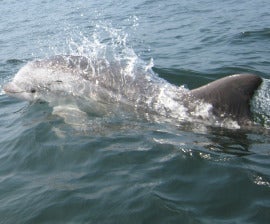-

Dolphin frolics off the coast of Peru. Melissa Singh/HSI
Why ecotourism?
Latin America contains the world’s two highest concentrations of biodiversity, with well over 700 animal species found nowhere else in the world. With little access to infrastructure and markets, communities often engage in activities that are harmful to these animals and their habitat. Hunting for food, selling animals for the international pet trade, cutting trees for sale or clearing land for agriculture all have devastating effects on wildlife. Ecotourism gives local communities a non-extractive method for capitalizing on their natural resources.
HSI is working with local partners in Latin America to develop community ecotourism programs that highlight local wildlife and culture. When increased income from ecotourism motivates communities to protect wildlife, everyone wins!
HSI’s wildlife ecotourism projects in Latin America
Costa Rica. In Corcovado National Park and the surrounding area, we are working to protect important sea turtle nesting beaches and other critical wildlife habitat. As an alternative to collecting and selling endangered sea turtle eggs , we offer locals the opportunity to take hospitality and English courses for local guides and small business operators so they can capture a larger share of the booming Costa Rican tourism market. We also provide funds for maintenance and administrative costs for Corcovado’s turtle hatchery program.
Dominican Republic. Just a stone’s throw away from the generic mega resorts that dot the Southeastern coast, we work with the community of Bayahibe to protect its resident dolphin population. We assist in the development of responsible dolphin watching tourism, and the cultivation of an authentic and enjoyable tourism experience. In addition to generation of guidelines, providing guide courses, and scientific research on the local dolphins, we are helping to create a community map to be distributed to tourists, as well as signposts for routes and trails around the town. We also provide funding for trail maintenance and development, adding benches to sites of interest, and architectural improvements on historical sites.
El Salvador. El Imposible National Park is El Salvador’s largest national park, with one of the last examples of Pacific coastal rainforest in Mesoamerica. HSI is working with the park staff to increase visitation to the park and make it a memorable and educational experience for all tourists. Our program is helping to create a protocol for visitor entry into the park including fees, guides, and visitor information. We are also assisting with the production of an interpretational video of the flora and fauna in the park to be shown at the visitors’ center.
Honduras. A few miles off the coast of mainland Honduras, Cayos Cochinos is a marine protected area comprised of 13 pristine cays, and home to the endemic pink boa constrictor. To discourage the capture of these uniquely hued snakes for sale in the international pet trade, we are collaborating with our local counterpart and the community of East End to develop a small ecotourism complex. The plans include two cabins, a small restaurant, and an oceanview patio, with an eco-friendly waste disposal system to protect the local environment funded by HSI. Future plans include guide training, trail improvement and an informational center about the pink boa.
Guatemala. Guatemala’s Izabal region contains some of the highest levels of biodiversity in the country. Rare wildlife such as manatees and jaguars that frequent the area are bringing attention to this jungle ecosystem as a new ecotourism destination. HSI is working with our local counterpart to develop eco-friendly infrastructure, better road access, and training local tour guides to accommodate the budding ecotourism industry. Our program focuses on two community-based ecotourism projects in communities in the buffer zones of Cerro San Gil National Park, and the Río Sarstún Protected Area.
Nicaragua. Chacocente Wildlife Refuge is comprised of several important ecosystems that support populations of many beautiful and endangered species such as howler monkeys, exotic birds, and the highly endangered leatherback turtle. HSI is working with local community cooperatives to increase visibility of the refuge and train members of the cooperatives in basic hospitality and biology. Future funding will be used to build cabins and bathroom facilities, workshops on business management, and to rebuild trail infrastructure that was washed away during this year’s unusually strong rainy season.
Peru. HSI has been working with local partners in Peru for 10 years in order to improve the welfare of animals in the country. Over the past year, we worked with local NGOs and government agencies to bring about a resolution by the artisanal fishing federation to cease the hunting of dolphins, a reduction in availability of illegal dolphin meat in local markets, and an international press conference on sustainable dolphin watching as a new national tourism product. HSI is currently seeking partners to continue developing a sustainable dolphin watching program.
Long-Term Goals. Since our ultimate goal is to create sustainable economic alternatives, HSI plans to continue working with our programs in Latin America throughout the project development process. Once the current projects are viable tourism options, HSI hopes to offer trips to these sites for our constituents and donors.
Help protect wildlife during your travels
- Taking fauna and flora is prohibited in most protected areas and can be devastating in many sensitive ecosystems. Take a photograph—but leave plants, wildlife and corals behind for all to enjoy.
- Beware of products and foods made from wildlife. Even though they are often sold openly, many species of animals and plants are endangered and protected by local and international laws.
- Never feed, disturb, or get too close when viewing wild animals—for your safety and theirs!
- Look for hotels and tour operators that are environmentally responsible and support local communities. Always ask about their certifications, policies and regulations.
- Research before you go—many guidebooks and websites have valuable information to help you responsibly enjoy your vacation.
